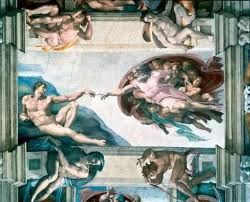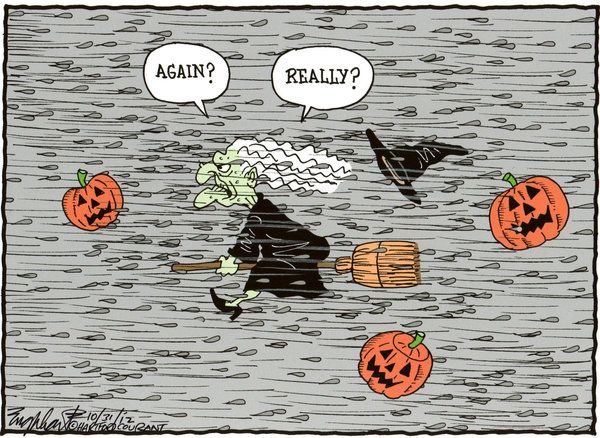“Punting the Pundits” is an Open Thread. It is a selection of editorials and opinions from around the news medium and the internet blogs. The intent is to provide a forum for your reactions and opinions, not just to the opinions presented, but to what ever you find important.
Thanks to ek hornbeck, click on the link and you can access all the past “Punting the Pundits”.
Follow us on Twitter @StarsHollowGzt
Rihard (RJ) Eskow: God’s Stimulus? It’ll Take More Than Just Money to Recover From Sandy
Hurricane Sandy was the stimulus nobody wanted. It took a terrible toll in lives, homes, and dreams. For the families who lost loved ones the tragedy will never end. And yet, in a bitter irony, this terrible storm will spur the kind of spending we should have been seeing all along. There will be jobs, at least for a while — in construction, road work, repair, and other lines of work.
This “accidental stimulus” won’t make up for the loss of life, treasure, and property. But it’s a reminder that the things which nurture us as human beings – the bonds of community, a sense of social responsibility, caring for one another – are also surprisingly sound economic principles.
The economic history of our last century illustrates something important: Our nation’s always prospered when we care for one another. We do best economically when we use our government as an expression of our best selves.
Paul Krugman: Disasters and Politics
(L)et me just take a moment to flag an issue others have been writing about: the weird Republican obsession with killing FEMA. Kevin Drum has the goods: they just keep doing it. George Bush the elder turned the agency into a dumping ground for hacks, with bad results; Clinton revived the agency; Bush the younger ruined it again; Obama revived it again; and Romney – with everyone still remembering Brownie and Katrina! – said that he wants to block-grant and privatize it. (And as far as I can tell, even TV news isn’t letting him Etch-A-Sketch the comment away).
There’s something pathological here. It’s really hard to think of a public service less likely to be suitable for privatization, and given the massive inequality of impacts by state, it really really isn’t block-grantable. Does the right somehow imagine that only Those People need disaster relief? Is the whole idea of helping people as opposed to hurting them just anathema?
It is no secret that political candidates are capable of doing awful things when they are reach the desperate final days of an election campaign.
But trying to scare American workers into believing that a government initiative that saved their industry was some sort of secret scheme to shutter major plants and offshore jobs is more than just creepy. It’s economic fear-mongering of a sort that is destructive to the spirit of communities and to the very future of the republic as an industrial force.
George Romney, who led the remarkable American Motors Company project that would eventually produce the Jeep, never in a political career that saw him win election as governor of Michigan and seek the Republican nomination for president would have engaged in such calumny.
But George Romney’s ne’re-do-well son, a very different sort of businessman who devoted his career to taking apart American companies and offshoring jobs, is trying to resurrect his presidential candidacy with a big lie.
Bill McKibbenSandy Forces Climate Change on US Election Despite Fossil Fuel Lobby
Such is Big Energy’s hold on DC, neither Obama nor Romney talk about climate change. But Americans are joining the dots
Here’s a sentence I wish I hadn’t written – it rolled out of my Macbook in May, part of an article for Rolling Stone that quickly went viral:
“Say something so big finally happens (a giant hurricane swamps Manhattan, a megadrought wipes out Midwest agriculture) that even the political power of the industry is inadequate to restrain legislators, who manage to regulate carbon.”
I wish I hadn’t written it because the first half gives me entirely undeserved credit for prescience: I had no idea both would, in fact, happen in the next six months. And I wish I hadn’t written it because now that my bluff’s been called, I’m doubting that even Sandy, the largest storm ever, will be enough to make our political class serious about climate change. [..]
If we’re going to change the political equation, we’re going to do it by going after the fossil fuel industry. They deserve it. As that Rolling Stone article of mine laid out, they’re planning to burn literally five times more carbon than the most conservative government on earth thinks is safe. They’ve turned into a rogue force.
Nicholas D. Kristof: Will Climate Get Some Respect Now?
President Obama and Mitt Romney seemed determined not to discuss climate change in this campaign. So thanks to Hurricane Sandy for forcing the issue: Isn’t it time to talk not only about weather, but also about climate?
It’s true, of course, that no single storm or drought can be attributed to climate change. Atlantic hurricanes in the Northeast go way back, as the catastrophic “snow hurricane” of 1804 attests. But many scientists believe that rising carbon emissions could make extreme weather – like Sandy – more likely. [..]
Democrats have been AWOL on climate change, but Republicans have been even more recalcitrant. Their failure is odd, because in other areas of national security Republicans pride themselves on their vigilance. Romney doesn’t want to wait until he sees an Iranian nuclear weapon before acting, so why the passivity about climate change?
David Morris: A Stormy Reminder of Why We Need Government
A job well done, from the local 911 switchboard to the White House
If this election is a referendum on the benefit of government then superstorm Sandy should be Exhibit A for the affirmative. The government weather service, using data from government weather satellites delivered a remarkably accurate and sobering long range forecast that both catalyzed action and gave communities sufficient time to prepare. Those visually stunning maps you saw on the web or t.v. were largely based on public data made publicly available from local, state and federal agencies. [..]
Seven years ago, Katrina showed the tragic consequences when government fails its duty to respond to natural disasters. But that was the exception that proves the rule. When disasters hit, the government is the only agent with the authority and capacity to marshal and mobilize resources sufficient to the undertaking. It can coordinate across jurisdictions and with both the public and private sectors. That’s because its mission is not to enhance its balance sheet but to preserve the well being of its citizens. And in October 2012 it has shown how effectively it can perform that task.


 As you all must have noticed at this point ek hornbeck & I have been absent for the last few days. The good news is that we and our families are safe, sound & dry. That’s about it for the good news.
As you all must have noticed at this point ek hornbeck & I have been absent for the last few days. The good news is that we and our families are safe, sound & dry. That’s about it for the good news.
Recent Comments